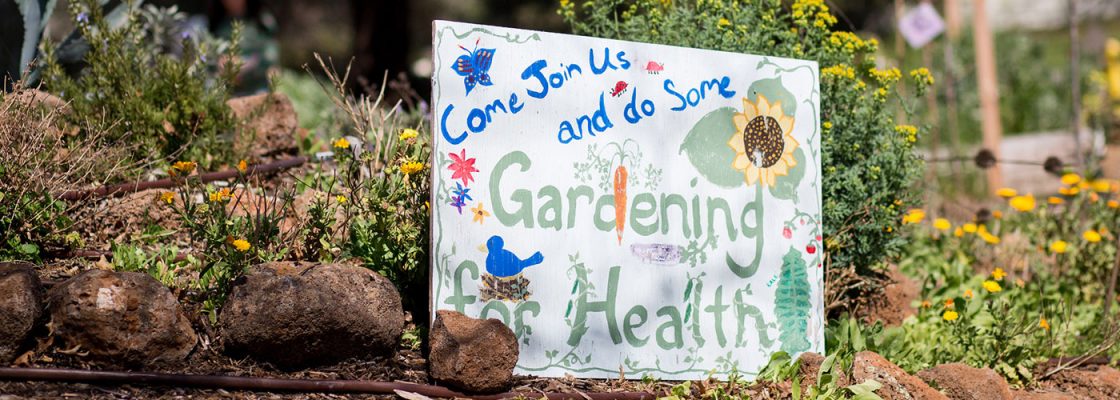From improving access to fresh vegetables to providing a place for exercise and outdoor activities, gardens can be great for the health of both an individual and a community. In recent years some clinics have cultivated gardens as spaces for patient education and community building. Open Door Community Health Centers has been working to take this work to a new level, developing innovative ways to incorporate their gardens into their care.

The Five Gardens
Open Door created it’s first health center garden as part of CCI’s Networking for Community Health program, launched in 2008. This first garden at the Del Norte Community Health Center offered families and community groups the chance to rent 68 4’x 8’ garden beds (including some built higher to accommodate gardeners with bad backs), plus four wheelchair-accessible beds, eight larger community beds for gardeners to share and a greenhouse. Next to it is a playground for children to play while adults tend to their plots.
Open Door has since expanded its gardening efforts to five sites in Humboldt and Del Norte Counties. In Arcata a nurse from Humboldt Open Door Clinic organized the community to revitalize a church garden that had gone fallow; now Open Door maintains the Arcata garden and distributes it’s produce at two of its nearby clinics. Another garden sits behind their Willow Creek Community Health Center on clinic property. Open Door also shares a plot in the Fortuna Garden Project.
The latest addition is a 3,000-square-foot garden at Open Door’s Eureka location, which produced 1,200 pounds of food in the 2014-15 growing season. Like all of Open Door’s gardens, Eureka is run by a combination of clinic staff, patients and community volunteers.
Treating Hunger in the Waiting Room
For many safety net patients, barriers to good health exist in the very economic geography of their local communities. Poor and rural areas often lack grocery stores or farmer’s markets that provide access to healthy foods like fresh fruits and vegetables. This food scarity has been linked to poor long-term health outcomes and chronic conditions such as diabetes. Many poor and underserved patients may also struggle with getting enough to eat, often having to chose between buying food and paying for other necessities like medicine or transportation.
For Open Door, the gardens provide a way to tackle this problem directly. Vegetables grown in the gardens are delivered to food banks, food pantries, homes for the elderly, and similar organizations. But some Open Door clinics also offer patients fresh fruits and vegetables in their waiting rooms and lobbies, labeled with a sign that says “help yourself.” Care teams are trained to look for signs that patients haven’t had enough to eat, and then offer such patients a nutritious snack. This builds trust and helps patients better compose themselves to talk to their provider about long term wellness. After the visit these patients are encouraged to take a bag of food with them.
A Prescription for Wellness
The work with these gardens has been part of a larger shift by Open Door to move beyond medical care towards services that improve patients’ overall wellness. This means proper nutrition and exercise, but it also means encouraging patients to form positive bonds with people in their community, to spend time enjoying the outdoors and to engage in labor that is meaningful and satisfying—all needs, conveniently, that can be met by a garden. Not only are wellness needs part of leading a fulfilling life, meeting them is also powerfully associated with improved health outcomes.
To this end Open Door has an initiative they are calling “Rx for Wellness.” Along with normal prescriptions for medications, providers can also give out slips that ‘prescribe’ a patient food pantry services, help with a Cal-Fresh application, or even gardening advice or a few hours helping in the clinic’s own gardens. Open Door health centers also offer patients a “Rx for Farmers’ Market,” each of which serves as a $2 voucher that can be used at local farmers’ stands (farmers can redeem these with their market, which gets reimbursed by the helath center). These vouchers not only help patients afford fresh food, but also encourage them to shop at farmers’ markets, which for some low-income patients can feel like the domain of the wealthy.
These suggestions nudge patients to get involved with the garden activities, and use the garden as a communication tool for providers to talk about wellness goals. This work flows from changes Open Door made through participation in CCI’s Health Home Innovation Fund program, during which they introduced quality measures around encouraging wellness. Now when patients come into the health center with accute needs, care teams also assess what preventive care needs these patients may have, and try set up a future preventive care appointment to set wellness goals. These goals are even tracked by providers in a patient’s chart.
Beyond the Dirt
For these clinics, the gardens also serve as spaces around which to center education and community outreach efforts. Open Door has used their garden to host a pediatric weight management program for families that included not only information on BMI and nutrition, but a tour of the garden and a zumba class. They are also working with an intern who, with a $10,000 grant awarded by Davis Projects for Peace, works with provider-referred patients to set up new gardens in their homes (the grant money covers lumber, seeds and other start up materials for these efforts). Maintenance of these gardens becomes part of the patient’s wellness goals, and prompt providers to check in on their gardening efforts during patient visits.
Learn More
- Open Door Community Health Centers has a dozen sites along 200 miles of northern California coast: opendoorhealth.com
- CCI’s Networking For Community Health and Health Home Innovation Fund programs were supported by The California Endowment.
- Download a PDF version of this brief.


